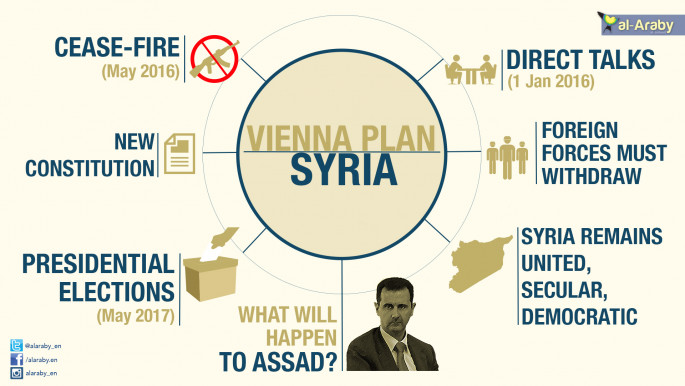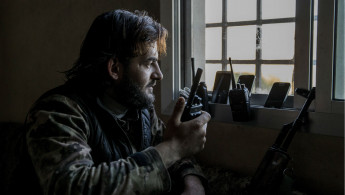Syria's opposition factions set framework for proposed talks
A Syrian opposition meeting on Thursday called for an all-inclusive, democratic Syria and said President Bashar al-Assad should leave power at the start of a transitional period, a copy of the final statement seen by Reuters said.
The participants at the Riyadh meeting backed a "democratic mechanism through a pluralistic regime that represents all sectors of the Syrian people," the statement said.
This would include women and would not discriminate on religious, sectarian or ethic grounds, it added. The participants also committed to preserving Syria's state institutions and restructuring the army and security services.
Also Thursday, a powerful osittion faction pulled out of the meeting in protest over the role given to groups it said are close to the Syrian government, signaling continued divisions among rival factions ahead of proposed peace negotiations with President Bashar Assad's government.
Ahrar al-Sham, a Saudi-backed ultraconservative group that operates mainly in northern Syria, withdrew said in a statement that it was withdrawing also because the conference failed to "confirm the Muslim identity of our people."
Other participants at the meeting agreed on a framework that would guide the proposed talks. They established a "supreme council" made up of 32 opposition members and representatives of rebel.
But how to get there - and what comes after - appeard to be a point of contention.
Over two days, Syria's often fractitious opposition tried to hammer out an agreement that would give them one voice in talks with a well-oiled and wily negotiating team from Damascus.
Tough opposition
The Riyadh talks comes after war-fatigued world and regional powers met and came out with a peace plan for Syria's warring parties.
This includes a tentative deadline for talks on 1 January, and given the huge bloodshed spilled over the past four years this is no easy feat.
One of the major obstacles for the rebels is division.
But the independence each rebel brigade retained, has also been a source of strength during the difficult four years of the war - the barrel bombs, gas attacks and starvation sieges.
They have managed to stand up to everything that the regime has thrown at them and like the anarchist militias of the Spanish civil war, independence and an unwavering sense of rightousness have helped them fight on.
This environment strengthened some of the opposition's most hardline elements such as al-Nusra Front, Jaish al-Islam and Ahrar al-Sham.
They remain militarily alligned to moderates such as the Free Syrian Army, but politically they are distant.
While the FSA fights quite clearly under the banner of democracy, it is more difficult to understand the aims of Salafi groups such as Ahrar al-Sham.
|
|
In a statement released earlier today in which the group announced that they were leaving the talks, they said they only came in the first place due to a "lack of representation of jihadist factions at a level matching their... role".
Peace or war?
Although Ahrar al-Sham and other Salafi groups obviously want an end to the cruelties of the Assad regime which they have witnessed first hand, they also want the establishment of a state ruled by "God's laws".
Whether this state is compatible with liberal or social democracy is contested by some members of the opposition.
There is also the division between opposition politicians in Europe, the Gulf and Turkey, and rebel groups on the battlefield.
Ahrar al-Sham has been on the frontline of the most brutal battles with the Syrian regime during the past four years.
Now it is the prime target of Russian air raids.
Obviously going to be frictions when they met with Paris and Washington-based politicians.
But fireworks were inevitable when the battle-hardened warriors met the Damascus-based National Coordination Committee for Democratic Change who are often viewed as the regime's Trojan horse in the opposition camp.
The group said they would leave the talks given "the fundamental role... given to personalities linked to the regime".
Obstacles
The absense what is one of the largest Syrian rebel groups would not only threaten to throw the opposition conference into chaos, but also seriously weaken negotiations with the Syrian regime.
Ahrar al-Sham have widely been viewed as Gulf-backed, and Saudi Arabia and Qatar diplomats will undoubtedly understand that the opposition will need this Salafi bloc in talks, if they are to get a peace worth pursuing.
With European nations and the US increasingly focusing on the Islamic State group - the new bogey men for them - and the Syrian refugee crisis, then the rebels no longer have widespread diplomatic western support.
 |
If they were to pull out of talks, while the zeitgeist of the global community is fixed on the idea of a "quick peace", then Ahrar al-Sham might find itself as jihadi outliers viewed akin to IS by the great and the powerful.
This is a link Russia and the Syrian regime have been trying to make throughout the conflict. Saudi patience might now been undoubtedly tested with their unwillingness to understand this.
United voice
By the end of the day it appeared that Ahrar al-Sham might be back on board, according to writer and researcher Charles Lister.
He said that one representative of Ahrar al-Sham will take part of the opposition negotiating team with the Syrian regime, along with one member of Islamist group Jaish al-Islam.
However, the eight other representatives from the armed opposition will be members of the FSA, while the negotiating team will be majority will be politicians and activists.
A final copy of the statement, which was released by Reuters, showed that the liberals and progressive appear to have won the show down with the Islamists.
The Riyadh meeting concluded that the country should be run on a "democratic mechanism through a pluralistic regime that represents all sectors of the Syrian people".
This will include women, and be representative of Syria's multi-ethnic and multi-religious communities.
Syrian state institutions,and the army and security services would be altered but kept together as entities.
Although this appears distant to the "Islamic state" envisioned by many rebels groups, there was one point of agreement.
Bashar al-Assad and his aides must step down from power before the beginning of the transition period.
It now looks like the opposition is ready to take on the regime in what will be the hardest part of the quest for peace.



